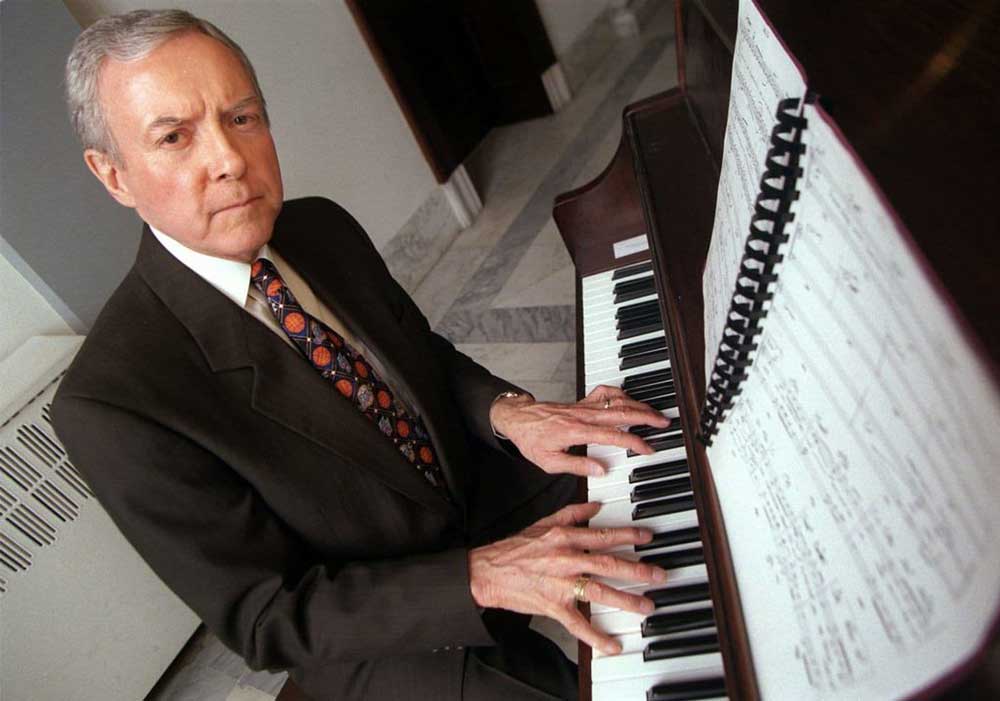
When he’s not crafting law, Senator Orrin Hatch (R-UT) is a songwriter and composer. (Photo: Cameron Craig / AP)
Continuing the music law reform momentum started in the House last month, Senator Orrin Hatch (R-UT) introduced the Music Modernization Act in the Senate today. Realizing the hopes of the recording industry, the Senate bill, S.2823, was identical to that passed by a 415-0 vote in the House last month, which should greatly streamline it’s passage.
The ambitious MMA seeks to update the way music is licensed and songwriters, artists and other creators are compensated, getting music out of the player piano era and into the digital age. The bill is noticed for a Senate Judiciary Committee hearing Tuesday (May 15) and is expected to get a full vote sometime in June, then on to the President’s desk to be signed into law.
The Senate bill was introduced with bi-partisan backing, with signatories including Chuck Grassley (R-IA), Sheldon Whitehouse (D-RI), Lamar Alexander (R-TN), Chris Coons (D-DE), John Kennedy (R-LA), Kamala Harris (D-CA), Bob Corker (R-TN), Dick Durbin (D-IL), Johnny Isakson (R-GA), Patrick Leahy (D-VT), Mike Crapo (R-ID), Doug Jones (D-AL), Thom Tillis (R-NC), Bill Nelson (D-FL) David Perdue (R-GA), Shelley Moore Capito (R-WV), and Roy Blunt (R-MO).
The Music Modernization Act combines three previously introduced pieces of legislation—the Music Modernization Act (MMA), the Compensating Legacy Artists for their Songs, Service, & Important Contributions to Society (CLASSICS) Act, and the Allocation for Music Producers (AMP) Act. The MMA has wide support across the music industry which welcomes the improvements to how songwriters, recording artists, labels, producers, sound engineers and digital music companies will do business.
“Today’s introduction is an important step toward enacting historic reform for our badly outdated music laws,” Hatch said. “For far too long, our old-fashioned, disorganized way of collecting and distributing music royalties has resulted in songwriters and other content creators being paid far too little for their work. It’s also exposed digital music companies to significant liability and created overall uncertainty in the music marketplace. As a songwriter myself, I know how important these issues are. That’s why I’m so pleased we’re taking this significant step today to bring fairness and certainty to our music laws.”
“Though the way we listen to music may change over time, the lasting mark music creators from all generations leave with us does not,” Grassley said. “This broadly bipartisan package ensures that all music creators have the access to the royalties they’ve earned and that music lovers can better access these works of art. I’m grateful for the hard work of my colleagues and stakeholders to advance this much-needed reform package.”
The move was hailed across the industry, with a fusselade of laudatory comments that can be read here.
Highlights from the combined bills are as follows.
Music Modernization Act (MMA):
- The MMA creates a new, simplified licensing system to make it easier for digital music companies to obtain a license for songs.
- The simplified system will also ensure songwriters are paid the royalties they are owed.
- In addition, the bill revises outdated songwriter royalty standards to ensure songwriters are paid a fair market rate for their work.
Compensating Legacy Artists for their Songs, Service, & Important Contributions to Society (CLASSICS) Act:
- In the 1970s, Congress extended federal copyright protections to sound recordings fixed after February 1972.
- The CLASSICS Act requires digital music services to pay for the use of pre-1972 sound recordings in the same way and at the same rate they pay for recordings fixed after 1972.
- SoundExchange, the entity that collects and distributes digital performance royalties for sound recordings, will collect royalties for pre-1972 recordings, as it does for recordings made after 1972.
Allocation for Music Producers (AMP) Act:
- Under current law, although recording artists have a right to a percentage of the royalties collected for digital performances of sound recordings, producers and engineers have no such right.
- The AMP Act would establish a procedure for producers and engineers who worked on sound recordings to apply for a share of the royalties.


Comments are closed.